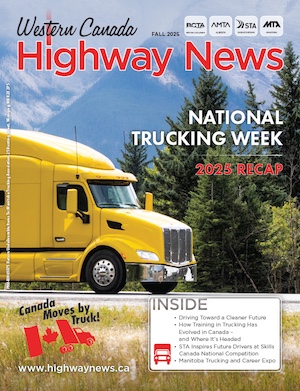On the morning of Friday, November 4, 11 medium and heavy-duty (MHD) vehicles made their way to 18,000 square feet of studio space in Langley, BC. These were not just any MHD vehicles – they were next-generation low and zero-emission vehicles from eight different original equipment manufacturers.
This extraordinary display was BC Trucking Association’s Zeroing in on ZEV – Low & Zero-Emission Commercial Vehicle Summit, the first event in Canada focused entirely on zero-emission commercial vehicles from several manufacturers under one roof. Over 175 guests were in attendance, including municipal, provincial, and federal government decision-makers, academia, environmental agencies, fleet owners, and BCTA members who wanted to learn more about transitioning to a green fleet.
Will the transition be an easy one? While the use of electric and hydrogen units for return to base and regional lanes is imminent, it is limited by the large price differential, range concerns, operating temperatures, BC’s mountainous terrain, and refuelling and charging infrastructure. Currently, the maximum range of market-ready heavy-duty zero-emission vehicles is 400 kilometres, which is sufficient for commercial vehicles that operate locally. Long-haul diesel tractors, on the other hand, can travel over 2,000 kilometres before needing to refuel.
Despite these challenges, the future looks bright as more and more zero-emission solutions arrive in markets around the world. Incentives, infrastructure investments, consistent ZEV policy framework, and customer commitment will help to make the changes necessary for a greener and cleaner industry.
Accelerate the Uptake
BC has seen explosive growth in light electric vehicle (EV) uptake. In 2016, only 5,000 light-duty EVs were registered, but by the end of the second quarter of 2022,
that number was over 85,000.1 Most of these vehicles operate locally, a very different duty cycle than heavy-duty vehicles. Only about 20% of heavy-duty commercial vehicles in BC operate in the local market and are potentially ready to begin transitioning to zero and low-emission vehicles.
While our collective focus is on the fight against climate change, we must also be mindful of the role our sector can play in support of affordable living, particularly for vulnerable populations. The impact of the cost of transportation on the pricing of goods is considerable. Affordability and the role transportation can play in helping support British Columbians are largely invisible and are often forgotten. Our sector transports 92% of all goods we consume provincially in full or in part, and 10% of a good’s cost reflects the cost of transportation.
This makes government support all the more critical, both to help the acceleration to green fleets and to ensure the transportation costs of goods remains affordable. Government has been a great partner in supporting the drive for BC’s commercial sector to become greener and cleaner by offering both infrastructure charging rebates for fleets and new vehicle incentives to help offset the cost of these vehicles. Government ZEV incentives, which provide up to $100,000 provincially and up to $150,000 federally, are available to help offset the increased cost of these vehicles. The province’s work to establish an alternative fueling network, including commercial charging stations and fueling stations for hydrogen and natural gas across BC, is welcome, as this is an emerging obstacle for the 20% of carriers that operate locally.
ZEV Sales Mandate
In the fight against climate change, BC has among the world’s most ambitious greenhouse gas (GHG) emissions reduction targets at 40% below 2007 levels by 2030, 60% by 2040, and 80% by 2050. As MHD vehicles are responsible for approximately 50% of GHG emissions produced from BC’s road transportation sources, the sector has a large role to play toward the provincial government delivering on its commitment to reduce climate pollution. One measure to lower GHG emissions is the recommendation for a province-wide ZEV sales mandate for BC’s commercial road transportation sector. BCTA is very supportive of working with government to establish a low
and zero-emission mandate. Critical, however, is that a ZEV mandate for new vehicle sales:
1) Allows for a phase-in period, such as by vehicle type and size;
2) Includes both zero and low-emission vehicles, recognizing there are currently no market-ready zero-emission long haul vehicles available; and
3) Includes funding for government to help establish a large network of commercial charging and fueling stations.
Without taking this approach, updating to zero and low-emission vehicles will be limited. In BC, 87% of carriers operate five or fewer trucks. To expect these carriers to adopt expensive new technology with no scaling capacity to absorb expensive infrastructure is unrealistic.
Getting Ready for the Future
Will the transition to net zero be easy for our industry? Simply put, no. Taking advantage of emission-reducing technologies and solutions that are available today is crucial to reaching 2050 targets. In fact, nearly two-thirds of GHG emissions reductions by 2030 would rely on solutions already commercially available.2 As we head towards the province’s net zero emissions goal, BCTA is committed to providing information, resources, and opportunities to support our industry’s transition to clean energy. We must continue to reduce the barriers to adopting ZEVs and utilize the technology that is available now to learn and grow our green transportation sector.
References
1 BC Government. (2022, June 1). BC supports EV adoption from purchase through repair. [Press release]. https://news.gov.bc.ca/releases/2022emli0037-000869.
2 Canada’s Net Zero Future (The Canadian Institute for Climate Choices, Feb 2021). https://climatechoices.ca/wp-content/uploads/2021/02/canadas-net-zero-future_summary_final.pdf.


 1-866-985-9791
1-866-985-9791



